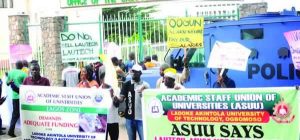
Nigeria in the last few years has become the subject of growing political debates many of which focus attention on the nation’s chances of surviving or failing as a political state. These concerns as expressed by citizens and social critics are nothing short of legitimate. Most Nigerians who express these fears have watched many countries with huge potentials suddenly slip into states of economic emergencies. While classic examples abound in this regard, Azerbaijan passes as one country which, in the course of its post-Soviet independence, has battled unforeseen circumstances especially brought home by the ‘Dutch disease’ which badly hit its economic fortune on account of its badly managed oil boom. Like Azerbaijan, Nigeria has toed the path of the ‘resource curse’.
According to economic experts, the resource curse theory gives focus to the trends of negative effects which the obvious abundance of natural resources has on the different sectors of a country’s life, including political, economic and social sectors. Expounding this more deeply, Ilkin Gasimov notes that nations with resource abundance often tend to develop less than the resource-deficit ones. Sadly, this challenge affects the political life of countries by decreasing institutional quality and increasing corruption. In the words of Gasimov, ‘Decreasing number of school enrolments and hospitals, low wages in education and health sectors are signs of resource curse problem in social life.’
With these expert views in mind, observers of goings-on in Nigeria over the past decade must have a fair idea that the West African giant has successfully chauffeured itself down to a precipice of irredeemably lost opportunities. As a nascent independent country, Nigeria had had the good fortune to manage its civil service structure and increase it proportional to its resource capacity. The popular S. O. Adebo and Jerome Oputa Udoji Commissions of the famed ‘Adebo’ and ‘Udoji’ Awards of the 1970s remain some of the abiding references to the Nigerian golden age, when the economic prosperity of the country had duly reflected in the thriving of its growing population. With few days into the nation’s sixtieth Independence anniversary, the Nigerian landscape is dotted with spates of protests and labour strikes that appear targeted at the jugular of government. In a latest development, the Nigeria Labour Congress has issued a two-week ultimatum to the Federal Government to reverse the recent hike in petroleum price and electricity tariffs, two mortar-and-brick increments that greeted the citizens in the wake of September.
Read Also: Invest In Public Health, Epidemics Are Facts Of Life -WHO Warns Countries
The latest threat of strike action being issued by labour leadership is one in the series of recurring industrial actions in recent times. It is coming only more than a week after the National Association of Resident Doctors (NARD), a body of doctors in the employ of government, called off its strike over government’s failure to meet its demands of a payment of unsettled wages, a raise in their pay package, alongside their demand for life insurance coverage, the provision of adequate bed spaces and drugs in public hospitals. The strike action, which had been foreshadowed by a warning strike by the resident doctors in June, is also directed at the provision of adequate protective equipment for doctors in the frontline of the treatment of coronavirus patients in the country. The call-off of the strike is only based on an agreement to give the government some time since, the industrial action is according to the government, ‘ill-timed’. A similar situation had been recorded in 2004 when the NARD had threatened to embark on strike indefinitely if the government failed to meet the demands over its members’ wages.
As though lurking in the shadows of the NARD’s September strike, the Joint Health Sector Unions (JOHESU) had followed the trail of the NARD by going on a warning strike on the midnight of Sunday, September 13, 2020 to press home its demand for hazard and inducement allowance. While the Nigerian Minister of Health has been on his feet in the bid to make all needed interventions to the NARD and the JOHESU from the government’s end, the Labour Minister, through his ministry’s spokesperson, only issued statement to the effect that the striking Union was going on a head collision with the International Labour Organisation’s ‘Principles and Conventions on Strike’ as well as section 18 of the Trades Disputes Act, Cap T8, Laws of the Federation of Nigeria, 2004. The Labour minister, among other things, also greeted the unionists with the accusation that JOHESU was attempting to ‘arm-twist’ the Federal Government to meet its demands.
Meanwhile, the recent increase in electricity tariff and the prices of petroleum products continues to attract negative feedbacks from the Nigerian public. There have been tiers of anti-government protests across states in the country, albeit these have been greeted with forceful dispersal of protesters by enforcement agencies.
As many similar situations and developments continue to unfold in the Aviation, Education and other sectors, it remains doubtful that the Nigerian state has learnt any lessons from the ill-fate that befell many oil-rich countries like itself. While the Nigerian Labour Congress is planning to make good its threat of a nationwide strike if government fails to reverse the new increments, there is a critical sense of the need to help both the government and its citizens appreciate the enormity of the national exigency before them.
With the prognosis showing that the future of oil tends towards uncertainties as the industrial value of crude oil, petroleum and its derivatives may not be in high demand in the next generation, many countries have since begun the process of diversifying their economies in participation and proactive preparation for a more competitive world economy and global political order. As countries of the world are shaping up into this new frame of thought, Nigeria apparently remains held in the doldrums of economic and political lethargy. She is failing to come to terms with the reality of the mileage it had lost especially the opportunities available to her to reinvent herself and bolster her national strength, with a view to becoming an active player in the new world that other nations presently race for.
Nigeria’s failings in this and many respects perhaps are inextricably linked with the failures of successive governments and political leaders to creatively and critically work out feasible frameworks that harmonise the country’s revenue and recurrent spending with the size of its civil- and public-service structure. The Nigerian civil and public services have continued to maintain an overblown personnel base. This has the huge implication of sinking the nation’s resources often without any accountability system to gauge government’s spending. Often, the Nigerian government finds itself in a series of shameful controversies over the actual size of its civil service.
Few years ago, the Association of Senior Civil Servants of Nigeria (ASCSN) had debunked an ascribed civil service figure of 1.2 million as overstated, insisting that ‘available records on the entire public service put the right figure at about 870,000 strong.’ Observed trends have always revealed the reluctance of the Budget Office of the Federation (BOF) and the Federal Ministry of Finance in making available records to show the true size of the Nigerian public workers database. While the sacrosanct figures for the nation’s civil service have continued to remain, at best, an adumbration to the curious members of the civil society, one thing is certain: the Nigerian state has bitten more than it can chew of the pie of public service enrolment. This singular factor is already largely accountable for the sinking state of public workers’ welfare and the implications of this for the general workings of the nation’s economy, vis-a-vis labour satisfaction, inflation and price systems.
In their 2013 paper titled ‘Civil Service and Cost of Governance in Nigeria,’ Okechukwu Innocent Eme and Andrew Ogbochie are quick to point out the admission by former president, Olusegun Obasanjo, in his June 5, 2003 speech to the National Assembly, that government in Nigeria is incrementally sunk by overbearing factors which include non-performance or gross under-performance of the Local Governments; the high cost of governments and near prohibitive costs of electioneering campaigns to individual political contestants in Nigeria; and continual fragmentation of Local Government Councils including impractical division of towns and cities into unworkable mini-Local Governments.
Since the stark reality of a white-elephant labour and civil service in Nigeria can no longer be denied nor renounced by the people and their government, the question must be asked of the likely reason why it seems to have been almost impossible for government to carry out any meaningful reforms particularly targeted at restructuring and downsizing its civil and public services. The possible response to this point of enquiry is not by any means hidden. The government has often maintained its conviction that such reforms will most likely be greeted with negative reactions and agitations from workers, especially as long as this move is bound to affect the vested interests of the various Labour Unions and their discrete leaderships. While it is common knowledge from the antecedents of unionists that leaders of labour unions often use the different labour platforms to enrich themselves, the government is also culpable of contributing to these problems through its compensatory culture of giving civil service and public service appointments to friends, children of friends and other political allies.
These unwarranted practices surely contribute to increasing the already high chances of bloating to costs of governance and government spending through the employment of individuals who often make little or no contributions to public administration and the productivity of government. Certainly, while members of the various unions are seen to make genuine demands of their government as is currently the case, Labour leaders often go the contrary way of compromising the demands from their memberships by reaching alternative and back-door bargains with any current government. In turn, government has found a formula for making good its own position by creating new factions out of existing labour unions, as in the fashion of the United Labour Congress, carved out of the pre-existing Nigeria’s Labour Congress (NLC), and the Congress of University Academics (CONUA), a factional offshoot of the Academic Staff Union of Universities (ASUU).
While all the recurring issues appertaining to labour in Nigeria may have been existing for up to thirty years, the seeming absence of a decisive solution to the problems does not speak to the inability of government to engage the professional knowledge and expertise of those who can make the right intervention in line with global best practices. The persistent problems only summons the failure of government to be sincere in its intra-governmental workings and ambivalent dealings with the labour force. As typical of the Nigerian political climate, in the face of grim and pressing issues of public concerns and national emergency, a current government often thinks first of the next election and the need to keep the sanctity of political affiliations and allegiance, rather than tackle the problems headlong with the best intellectual and human resources available to it.
Nature and history of many failed states as highlighted already are so far playing out in the field of governance in Nigeria. Whether government succeeds or fails remains a matter not only for time to reveal, but for the state and its populace to determine by examining their history with issues of similar imports, and taking lessons from where governments have failed in times past and why government may fail in the face of current labour situations in the country.
Abiodun Bello
Femi Morgan

